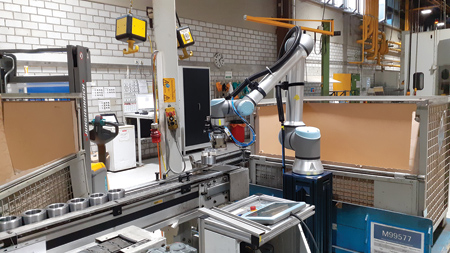
MIRAI robot control system enables hand-eye-coordinated actions for automation of tasks that improve productivity in industrial environments.
Micropsi Industries announced the successful closing of its $30 million Series B funding round. The company provides ready-to-use AI systems for controlling industrial robots to enable the automation of manufacturing processes that, so far, could not be automated.
By using cameras and sensors to react in real time to dynamic conditions in a workspace, Micropsi-powered robots can be trained by humans to perform hand-eye-coordinated actions in industrial environments. MIRAI is successfully deployed in assembly, material handling and quality control applications in a wide range of industries. Companies like Siemens Energy; ZF Group, one of the largest automotive suppliers in the world; and BSH, the largest manufacturer of home appliances in Europe, are already using MIRAI in their production halls.
New investors Metaplanet, VSquared and Ahren Innovation Capital co-led the funding round. Existing investors Project A Ventures and M Ventures also participated.
"Our technology makes it easy to transfer dynamic motion know-how from humans to robots," said Ronnie Vuine, CEO and co-founder of Micropsi. "We have not optimized the textbook approach for specific applications, but took a radically different approach inspired by how humans coordinate motions. MIRAI is a proven and independent technology that is working 24/7 in the factories of our customers. That is what convinced our investors."
"Industrial robots can compensate for labor shortages and secure supply chains," said a spokesperson. "The manufacturing skills gap in the U.S, for example, could result in 2.1 million unfilled jobs by 2030. Before factories can put robots into service, however, a lot of preparatory work is necessary, with specialists developing software code line by line to trigger the individual movements of the machines. This is complex, expensive and makes robots inflexible, since variance in positions or materials throw the robots off."
Micropsi's MIRAI changes this. Using AI, workers are able to train the machines through demonstration. A human guides the robot arm through the work task, and the robot learns and carries out the movements autonomously. In doing so, it is able to handle variance and changes in the environment and the robot's target at execution time. This expands the commercial potential of industrial robots, because it allows them to handle complexity and keeps them flexible even as conditions change.
MIRAI augments industrial robots. Once configured with MIRAI, a robot arm can perceive its workspace through cameras and continuously adjust its movements as it performs a task. MIRAI skills are not programs, rather they are collected intuitions of human movement that MIRAI then intelligently transfers to robots.
The new funding is going to be used to expand operations in the U.S., ramp up sales efforts and expand to more robot platforms. Micropsi Industries recently hired robotics expert Professor Dominik Bösl as Managing Director to be in charge of the company's ambitious technology roadmap. Bösl previously held positions at Festo, Kuka and Microsoft.
For more information contact:
Micropsi Industries USA, Inc.
149 New Montgomery Street, 4th Floor
San Francisco, CA 94105
718-440-7353
www.micropsi-industries.com